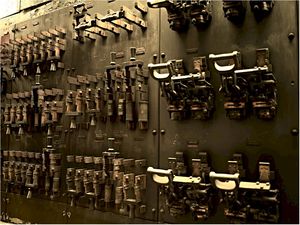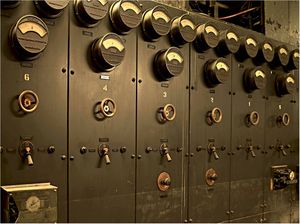Milestones:Largest Private (dc) Generating Plant in the U.S.A., 1929: Difference between revisions
No edit summary |
No edit summary |
||
| Line 1: | Line 1: | ||
=== Largest Private (DC) Generating Plant in the U.S.A., 1929 === | === Largest Private (DC) Generating Plant in the U.S.A., 1929 === | ||
''The Direct Current (dc) generating plant installed at the New Yorker Hotel in 1929, capable of supplying electric power sufficient for a city of 35,000 people, was the largest private generating plant in the U.S.A. Steam engines drove electric generators, with exhaust steam used for heating and other facilities. The installation used more than two hundred dc motors, and was controlled from a seven-foot (two-meter) high, sixty-foot (eighteen-meter) long switchboard.<br>'' | ''The Direct Current (dc) generating plant installed at the New Yorker Hotel in 1929, capable of supplying electric power sufficient for a city of 35,000 people, was the largest private generating plant in the U.S.A. Steam engines drove electric generators, with exhaust steam used for heating and other facilities. The installation used more than two hundred dc motors, and was controlled from a seven-foot (two-meter) high, sixty-foot (eighteen-meter) long switchboard.[[Image:Hotel_New_Yorker_DC_board_1.jpg|thumb|The DC control board at the Hotel New Yorker, photograph courtesy of Joseph Kinney]]<br>'' | ||
What would be described today as a "cogeneration" facility was incorporated into the design of the hotel. Steam engines were to drive electric generators, and the exhaust steam from these engines would then be used for heating the building as well as in other facilities, such as the hotel laundry. A cost analysis performed at that time showed a savings of US$48,000 per year as compared to the cost of purchasing electric power.<br> | What would be described today as a "cogeneration" facility was incorporated into the design of the hotel. Steam engines were to drive electric generators, and the exhaust steam from these engines would then be used for heating the building as well as in other facilities, such as the hotel laundry. A cost analysis performed at that time showed a savings of US$48,000 per year as compared to the cost of purchasing electric power.<br> | ||
The Hotel New Yorker was also the residence of Nikola Tesla for the last ten years of his life until his death in 1943. | The Hotel New Yorker was also the residence of Nikola Tesla for the last ten years of his life until his death in 1943. | ||
[[Image:Hotel_New_Yorker_DC_Board_2.jpg|thumb|left|Dials on the Hotel New Yorker DC control board, photograph courtesy of Joseph Kinney]]<br>"Powering the New Yorker" by Tom Blalock. This afticle was published in |EEE<br>Power & Energy Magazine( Volume4 , Number 1, January/Februarv 2006 | |||
[[Category:Power%2C_energy_%26_industry_application|{{PAGENAME}}]] | |||
[[Category:Power_generation|{{PAGENAME}}]] | |||
[[Category:Power_generation_planning|{{PAGENAME}}]] | |||
Revision as of 14:48, 6 October 2008
Largest Private (DC) Generating Plant in the U.S.A., 1929
The Direct Current (dc) generating plant installed at the New Yorker Hotel in 1929, capable of supplying electric power sufficient for a city of 35,000 people, was the largest private generating plant in the U.S.A. Steam engines drove electric generators, with exhaust steam used for heating and other facilities. The installation used more than two hundred dc motors, and was controlled from a seven-foot (two-meter) high, sixty-foot (eighteen-meter) long switchboard.
What would be described today as a "cogeneration" facility was incorporated into the design of the hotel. Steam engines were to drive electric generators, and the exhaust steam from these engines would then be used for heating the building as well as in other facilities, such as the hotel laundry. A cost analysis performed at that time showed a savings of US$48,000 per year as compared to the cost of purchasing electric power.
The Hotel New Yorker was also the residence of Nikola Tesla for the last ten years of his life until his death in 1943.
"Powering the New Yorker" by Tom Blalock. This afticle was published in |EEE
Power & Energy Magazine( Volume4 , Number 1, January/Februarv 2006

